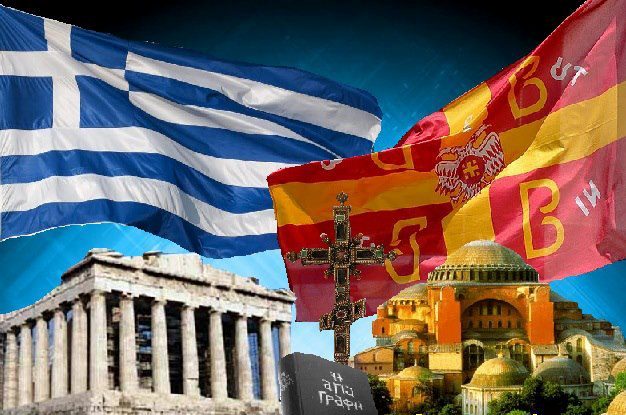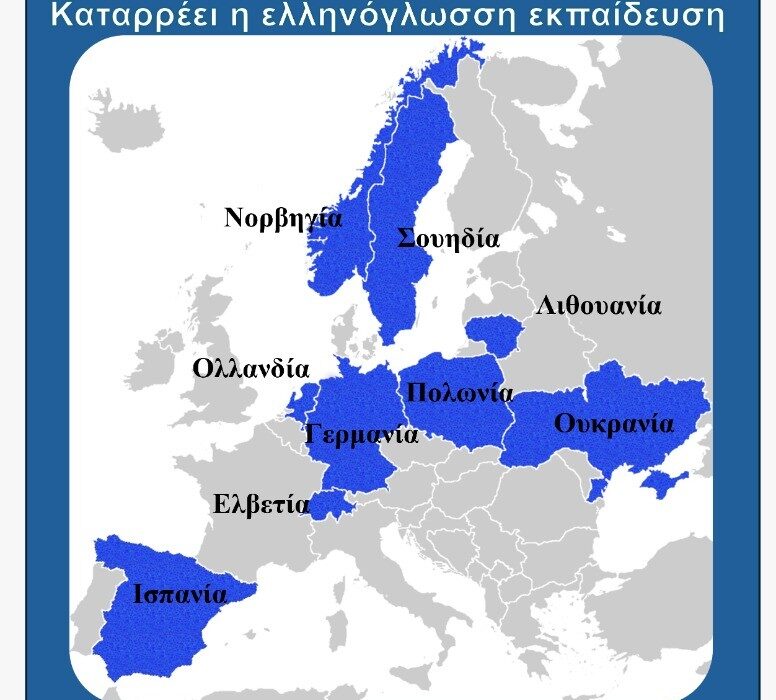“The Polis (City)* was the sword, the Polis the spear, the Polis was the key to all Romanía.”**
On May 11, 330 AD, Nova Roma—New Rome—the new capital of the Roman Empire, the new capital of Romanía, was inaugurated with splendour by Constantine the Great.
Legend has it that as the Emperor traced the boundaries of the city, he followed an angel of the Lord who pointed out the markers. From the very beginning the city was sacred and was dedicated to its Protectress, the Most Holy Theotokos. With the passage of time, and in honour of Saint Constantine the Great, the city received the name Constantinople.
Constantinople was not merely the supranational administrative centre of Romanía (the so-called Byzantine Empire), nor merely a vast commercial, economic, military, cultural, and social hub. From the outset it bore the conditions—and very soon became—the ecumenical centre of the Orthodox world. Orthodoxy provided the meaning, the purpose, and the central axis of this city’s existence. And in turn, Orthodoxy breathed into Constantinople and into all Romeosyne a pulse of immortality and eternity.
It is exceedingly difficult for the modern person to approach and comprehend the identity of Constantinople—and indeed of all Romanía. This is because the modern mindset is accustomed to analysing realities in the terms of modernity: individualism, the nation-state, boundaries. Romanía was not defined by its frontiers; it had no bounds—or rather, its bounds were the oikoumene. It was, and is, an ontological body composed of the Romeoi who have gone before, who are now living, and those yet to come. These people are men and women who, taking as starting point and foundation the Hellenistic civilisation and the Roman tradition, willed to live their Orthodox faith both personally and collectively—in the order of the polity.
Despite successive sins and personal failings, their common direction and desire was Christ and living in communion with Him. All of them—from the last Romeos to the head of the state, the very emperor himself. A State, a Polity, forged by the consonance and assumption of seeming contraries: empire and power on the one hand, yet humility and repentance on the other; purple and golden diadems without, yet noetic prayer and hesychasm within; sceptres of authority by day, yet sleeping on the floor and other ascetic labours by night. A striving and contest for holiness regardless of rank, place, or time—for in terms of holiness, “place” is everywhere and “time” is always. A collective ontological body with many sins seeking sanctity through much repentance; the kingdom of Christ on earth with human weaknesses and failings; a Christian empire— unique, universal, ecumenical.
This was—and is—Romanía: a way of life and an event of the heart. Romanía was never delimited by borders. It never sought to seize territories and treasures; it always sought to win hearts and souls. It desired to illumine peoples—all peoples—ever honouring their personhood, identity, and distinctive character. Romanía was not abolished in 1204, nor in 1453. She continued to exist and grew strong in the hearts of our forebears. Romanía weathered the relentless persecution inflicted by the Bavarian Regency in 1830 and continues to stand firm against the sustained and intolerable pressure toward Frankishness and westernization over the last two centuries. Today Romanía lives and pulsates powerfully in the hearts of all who feel themselves Romeoi around the world: from Jerusalem and Syria, where she suffers persecution, to the United States; from the Scandinavian lands to the furthest reaches of South Africa. Romanía: ecumenical, supranational, Orthodox—offered as a way of life amid the oncoming post-modern darkness.
And the everlasting capital and centre of Romanía was, is, and shall remain Constantinople. The eternal centre and heart of the devout people of the Romeoi was, is, and shall remain the Polis. Regardless of her present inhabitants— regardless of who they are or what they believe or their number. Let them be of another faith; let them be twenty million, let them be two hundred million—it matters little. The soil of the Polis is holy, hallowed by the countless choirs of our sainted forebears and martyrs. Soil fragrant with the presence of sacred relics; soil that exudes doxologies and prayers; soil that shines unceasingly with the unwaning light of the glory of the saints and with the presence of the Protectress, the Most Holy Theotokos. Though we possess nothing, everything is ours. The Polis is ours—now and always. The crown and pride of the Romeoi. She is the symbol, the living memory, our cohesion, our point of reference; she is our spiritual and earthly centre; she is our history and our future; she is our life.
Let us neither complain nor grumble over her present condition. Bitterness does not befit us. Let us not look at the Polis outwardly and superficially; let us look more deeply. Such a gaze will reveal that the Polis is free. Death did not conquer her. The Polis is ceaselessly being liturgized—without interruption— both visibly and invisibly. She is being liturgized, sanctified, and remains free. The rest lies in the hands of God. As for us, let us taste the joy of this freedom. Let us visit the Polis outwardly—or even secretly, inwardly; let us study her; let us knead our being with her pulse; let us feel her as our own and as a foundational part of our existence; let us love her and pray for her—the Polis, the heart of the Romeoi, the heart of the Orthodox.
And above all, let us banish from our mind every nationalist shadow and egoism, as well as every other worldly agenda and vainglory. Only then shall we be able to taste the inexpressible joy she offers us. The rest lies in God’s hands and will unfold as He deems and judges right. And perhaps—just perhaps—the more swiftly we cast off and strip away whatever worldly mind-set we bear, the more readily the spiritual way will open also to other unforeseen developments.
Ioannis Kon. Neonakis
Head of the Romeosyne Section of NIKI
(*) Ιn their daily life, the people called Constantinople simply the Polis (the City), thereby acknowledging and expressing the great significance it held for them.
(**) Stamatis Spanoudakis, from his song “You Will Come Like Lightning.”
Notes: (a) The term “Romanía” (with an accent on the í to distinguish it from the modern state of Romania) is the correct designation for the Roman Empire after the transfer of its capital, instead of the erroneous and deliberately employed term “Byzantium”.
(b) For reasons of more accurate phonological rendering and simplification, the term “Romeoi” was preferred over “Rhomaioi”.
(c) The term “Romeosyne” was preferred over “Romanitas”, as it better expresses the culture of the Roman Empire after the prevalence of Christianity.
Labels: Constantinople, Romeosyne, Romanía, Ioannis Neonakis



